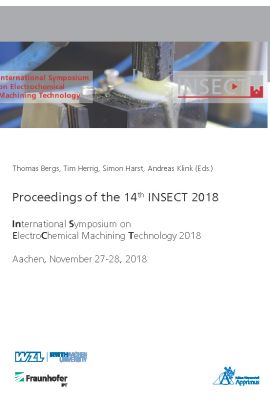Electrochemical machining (ECM) becomes more important with increasing requirements on material properties, manufacturing technologies and workpiece quality. In the ECM community, microprocessing plays an increasing role in addition to conventional fields of ECM applications, i.e. aircraft manufacturing or the automotive industry. Besides regular metals, customers focus more and more on materials difficult to machine, such as cemented carbides, titanium or metallic glasses. For that reason, extensive knowledge of the fundamental electrochemical processes at high current densities is just as essential as the interaction between processing and material properties, and a further development of the technical equipment.
For future challenges, close cooperation between researchers and industrial partners is a fundamental condition for innovative results and their rapid transfer to industrial applications. The INSECT brings together academia and industry, and offers a perfect platform for scientific discussions as well as networking.
After Düsseldorf (2004), Freiburg (2005), Dresden (2006, 2009) Chemnitz (2007, 2013), Brussels (2010), Vienna (2011), Krakow (2012), Saarbrücken (2014), Linz (2015), Mechelen (2016) and Dresden (2017), this year’s symposium is held in Aachen, taking place at Laboratory for Machine Tools and Production Engineering (WZL) of RWTH Aachen University and Fraunhofer IPT.
| Autor | Bergs, Thomas; Herrig, Tim; Harst, Simon; Klink, Andreas (Hrsg.) |
|---|---|
| Lieferzeit | 3-4 Tage |
| Gewicht | 0.34 kg |
| Erscheinungsdatum | 16.11.2018 |
Ingenieurwissenschaften
Proceedings of the 14th INSECT 2018 International Symposium on ElectroChemical Machining Technology 2018
Kurzbeschreibung
Electrochemical machining (ECM) becomes more important with increasing requirements on material properties, manufacturing technologies and workpiece quality. In the ECM community, microprocessing plays an increasing role in addition to conventional fields of ECM applications, i.e. aircraft manufacturing or the automotive industry. Besides regular metals, customers focus more and more on materials difficult to machine, such as cemented carbides, titanium or metallic glasses. For that reason, extensive knowledge of the fundamental electrochemical processes at high current densities is just as essential as the interaction between processing and material properties, and a further development of the technical equipment.

